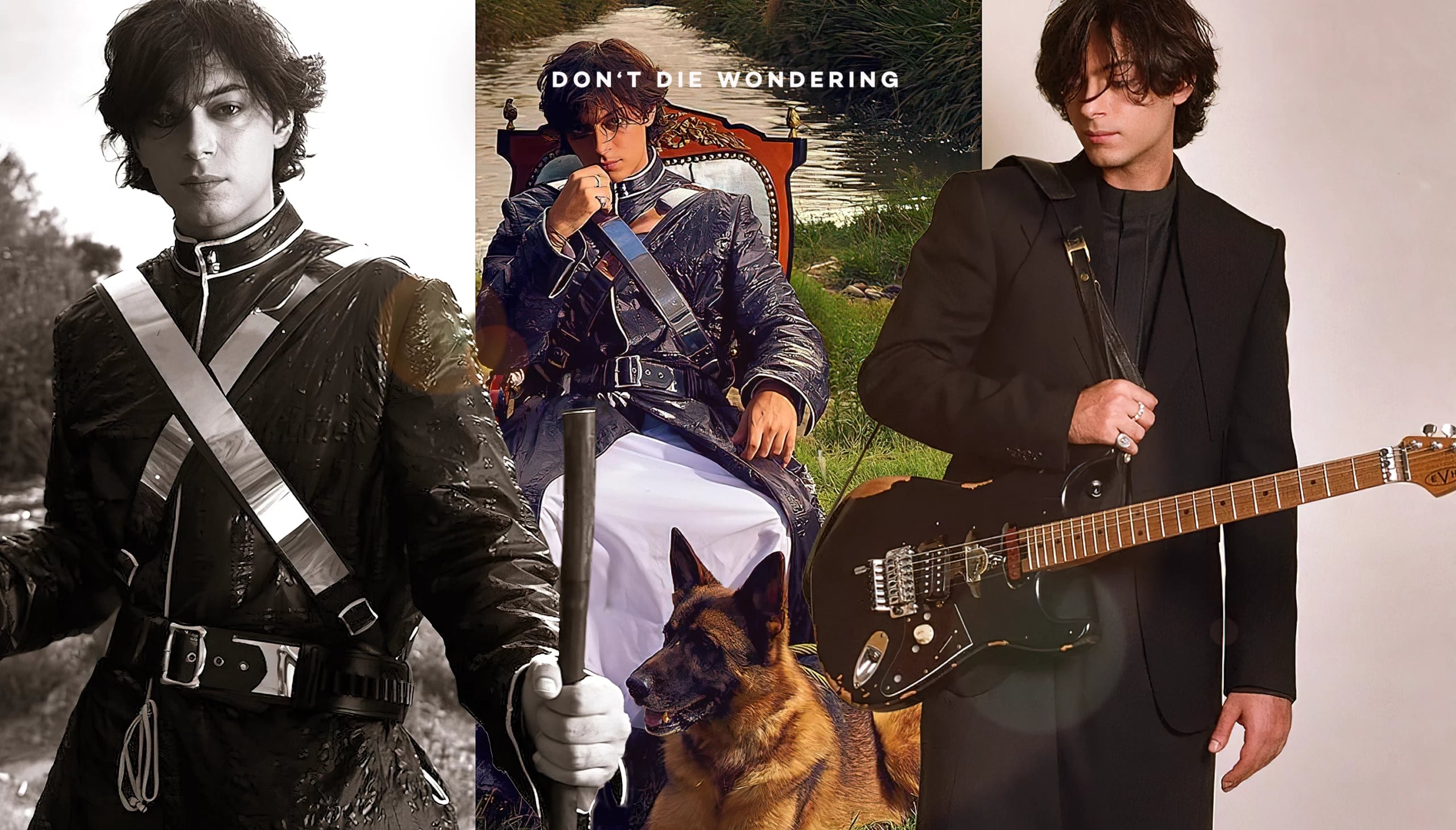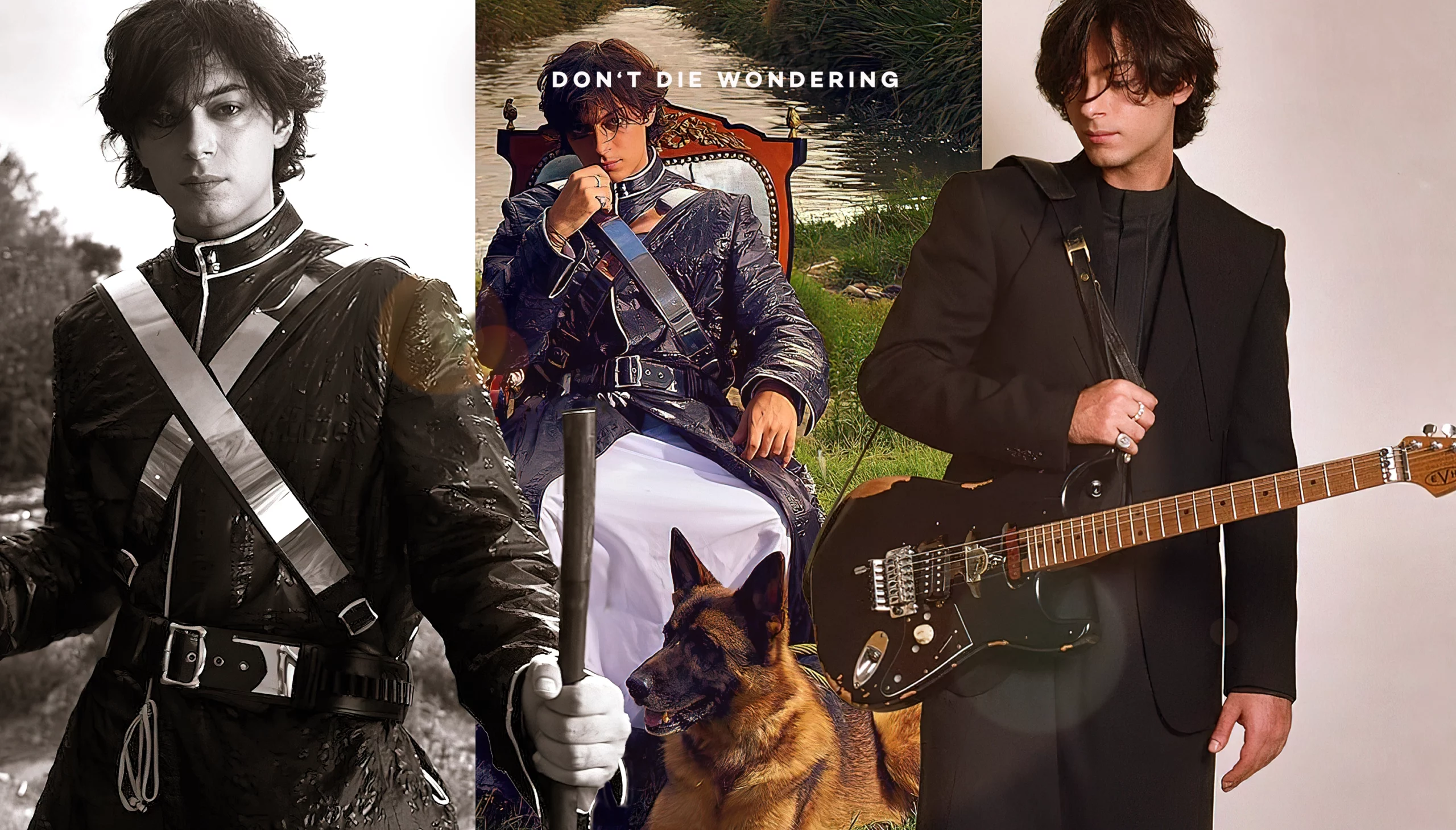Saudi artist Mishaal Tamer breaks musical boundaries, transforming personal struggles into a raw, genre-defying sound of self-expression.
Music has always been Mishaal Tamer‘s sanctuary—a space where vulnerability meets rebellion, and personal struggle transforms into art. Rising from anonymous online uploads to becoming a voice of Saudi Arabia’s creative renaissance, Tamer weaves together sounds as complex and nuanced as his own identity. His debut album Home is Changing is more than a collection of tracks that are intriguing and different (because that is precisely the magic behind Tamer’s sound); it’s a manifesto of self-expression, challenging listeners to look beyond stereotypes and embrace the multifaceted nature of contemporary artistic experience.
DDW spoke to Mishaal to discuss all things identity, sound and how to find one’s niche in an industry saturated with talent.

Your early music was uploaded anonymously and gained viral traction before you were widely known. What inspired you to remain anonymous at the start of your career, and how did that influence the music you created?
I grew up in a home with only brothers. I wasn’t very sporty, but the music became my little secret. I began writing and singing in falsetto because I wouldn’t want my brothers hearing me. I was shy. But online, I never minded people sampling me or using my music in whatever way they wanted. I love to share. Even today there are fans making theory pages for the music and making interpretations, I love to see that. This music is to be shared and interpreted or maybe even used in whatever way you (the listener) see fit, it is yours now.
You blend various genres, including Khaleeji, indie, and even metal, often concealing traditional sounds within modern pop structures. Can you talk about how you decide which elements of your heritage to highlight or hide in your tracks?
Right now, I’m just so excited to be making music freely that I don’t want to put myself in any box. Like many Saudis, we are very young, and we all grew up on the internet, a nation of the future inspired by the world. So far I haven’t stuck to one genre or style, it differs per song and depends what emotions I need to convey. If I need to scream, I’ll scream and if I need to whisper, I’ll whisper. This music isn’t for making money or gaining notoriety. It is purely a means of self-expression, so the parts of my heritage to be found in the tracks are simply there because they’re a part of me.
You’ve shared that during a difficult time in your life, you created over 800 songs, many of which remain unreleased. What is it like to have such a vast body of work that may never be heard by the public? Is there a reason you choose to ‘conceal’ certain pieces? How do you decide what to reveal versus what to conceal in terms of your musical output?
I don’t mind it. These songs were made by myself for myself, and they’ve helped me through a lot. I was worried at first that the songs wouldn’t resonate or connect with people because they were so specific to my life. After showing snippets, I saw that I was wrong, and that this stuff (the album) deserves to be out there. It’s all about the story. The 5 Chapters of Home is Changing.

You’ve described your music as deeply personal and sometimes uncomfortable to share. How do you decide what parts of your life and emotions to reveal through your art, and are there parts you consciously keep hidden?
Today I can proudly say that with the album Home is Changing you as a listener get a snapshot of me. No filter, nothing hidden, everything laid naked and bare. It may not all be pretty, but at least it’s real.
The track “Disco Cowboy” represents a persona you developed during a time of personal disconnection. How much of the real Mishaal is concealed behind this persona, and how do you use alter egos or personas in your music?
It’s more a reflection of a time in my life that I like to call “THE DEEP”. it’s called that because that’s exactly what it feels like to me. You’re down there lost and it’s dark and it’s overwhelming and almost feels like you’re stuck in a way too. That’s chapter 1 of Home is Changing, “THE DEEP”. ‘Disco Cowboy’ begins with the lowest note available on this broken piano I have here at home because to me that symbolizes entering the deep as that is where the story begins, rock bottom.
How do you approach using characters or personas in your music, and how do they help or hinder your connection with your listeners?
As an artist, I am a very big fan of the creator of Dark Souls and Elden Ring (Hidetaka Miyazaki). I just like to tell a story in my own way. Instead of playing characters in my work, I prefer to leave little details all over the project that tie things together or connect the dots between the songs.
In a world of instant fame and transparency, how do you maintain control over what parts of your identity as Mishaal are visible to your fans versus what remains private or concealed? Has this balance shifted as your fame has grown?
I’m a very private person, I always have been. It has changed recently, I’ve made a switch in which I’m no longer behind my social media and if fans want to reach me they can do so via hand written letters to my mail. This switch was actually inspired by what many Manga authors do with their fans, and it has worked wonders for my mental health and quality of life. In the outside world however, I love meeting fans and learning more about them as people. I may be shy but I’m still friendly so please don’t hesitate to come say hi 👋🏽
You’ve spoken about using unconventional equipment, like an Xbox mic, to create some of your early viral hits. How does this ‘concealing’ of professional-grade tools align with your musical philosophy?
It was just all I had access to at the time. I didn’t have a microphone, and I wasn’t allowed to get a DAW. So my friend Abdullah helped me by making a simple one. I then made the reverbs by playing my vocals off my speakers and recording them again using the natural sound created by the room its rerecorded in whether that be a bathroom or hallway. There’s no philosophy really I just wanted to get a specific sound and would do anything to get it.
Do you think it contributed to the raw, unfiltered sound that defined your early music?
Yes. I got my start because of a genre that focused on low fidelity sound before I even knew what it was. I guess I was lucky in a way to just not have equipment.
The concept of ‘Home is Changing’ not only reflects your personal journey but also Saudi Arabia’s cultural shift. How do you balance your desire to reflect these changes with the pressure to conceal certain parts of your background or identity in order to appeal to a global audience?
I’m of the mind that I shouldn’t conceal anything and so I don’t. Home IS changing and the youth of Saudi Arabia deserve a voice. This is a new Saudi Arabia and I’m proud to be Saudi.
There are so many misconceptions about us, but the truth is we are flourishing as a country and people. We are not oppressed, we are proud.
You’ve been vocal about your struggles with mental health, and your music often touches on deeply vulnerable themes. Do you ever feel like concealing your emotions in your art, or is vulnerability a conscious tool in your creative process?
The creative process is just therapy. It’s pure expression, it’s freedom, and to me it’s the best use of my time. This whole album was made before I knew anyone would hear it. It was just for me at a time when I was doing a lot of self-reflection and realization and so it is entirely honest. The conscious choice of being vulnerable with the world came only with the decision to release Home is Changing.
What role does mystery play in modern music? With the rise of social media, many artists feel pressure to reveal everything about their personal lives. How do you approach this, and do you think there’s power in keeping certain things about yourself hidden?
To me there’s a difference between artist and influencer. I care about art more than how many people I reach/influence. As long as my work is making a positive change in someone’s life out there, I will keep going.


